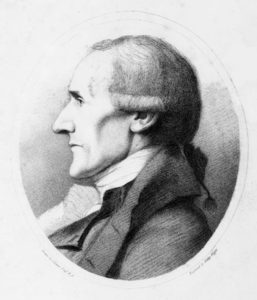
Granville Sharpe
Granville Sharpe was born on this date in 1735. He was a white-European abolitionist and philanthropist.
He was born in Durham, England, the son of an Episcopalian archdeacon. 1748 Sharpe attended grammar school in Durham and then moved to London to work with a Quaker merchant. Over the next ten years, he taught himself Greek and Hebrew. In 1765, he began working in civil service as a minor clerk. Sharpe had a brother who was a doctor in London. One day, on a visit to his office, he met a Black slave, Jonathon Strong, who had been beaten by his master and left to die. Sharpe's brother helped the slave recover.
Two years later, the master spotted his slave and secretly sold him to another slave owner, trying to conspire to have him kidnapped and sent back into slavery in Jamaica. Strong appealed to Sharpe for help. Sharpe brought his case before the Lord Mayor of London, who decided Strong was free. Sharpe's 1769 anti-slavery publication provided legal arguments that attacked the ruling by Yorke and Talbot in 1729 that slaves remained the property of their owners in England and the colonies. Between 1765 and 1770, Sharpe also began defending "Shanghai-ed" slaves and former slaves.
The courts never granted Sharpe a broad anti-slavery ruling, but the individual cases were usually decided in Sharpe's favor. In 1772, Sharpe was involved in another legal case that is historically called the Charter of Freedom. Here, it was written, "England is a soil whose air is deemed too pure for slaves to breathe in." Sharpe also was involved in creating a colony in Africa for relocated slaves. Later known as Freetown, the colony was in present-day Sierra Leone. Though the colony was not well planned, 397 Black Africans sailed there, but ten years later, the colony failed.
Sharpe worked closely with Thomas Clarkson and William Wilberforce, opposing the British war with the United States in 1776. A co-founder of the American Episcopalian Church, in 1787, Sharp and others formed the Society for the Abolition of the Slave Trade. That same year, he published his pamphlet, "A Summary View of the Slave Trade and the Probable Consequences of Its Abolition." After passing the Abolition of the Slave Trade Act in 1807, Sharp and others formed the Society for the Mitigation and Gradual Abolition of Slavery.
Granville Sharp, however, was not to see the final abolition of slavery, dying on July 6, 1813.